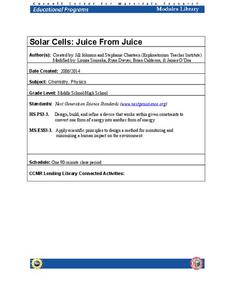Agency for Toxic Substances and Disease Registry
Don't Mess with Mercury (Lesson A)
Mercury is the only metal that is a liquid at room temperature. Teach your class this and many more interesting mercury facts by assigning an engaging task. A public relations activity, the exercise informs pupils of the hazards of...
LABScI
Acoustics: The Sound Lab
If the delay between a sound and its echo is less than 1/10th of a second, the human ear can’t distinguish it. Through the use of a Slinky, rubber band guitar, and straws, scholars explore where sound comes from and how it travels. Whole...
Rube Goldberg
Rube Goldberg Machines
Use humor to study simple machines! An engaging set of nine lessons allows learners to explore simple machines, kinetic, and potential energy as they work through cartoon renditions inspired by Rube Goldberg. Choose one or multiple...
Towson University
The Wildlife Forensics Lab
Can science put an end to the poaching of endangered species? Show your young forensic experts how biotechnology can help save wildlife through an exciting electrophoresis lab. Grouped pupils analyze shark DNA to determine if it came...
Curated OER
Phases of the Moon
Sixth graders learn that the moon orbits the Earth in a predictable cycle. Each learner engages in a two-week observation of the moon. They sketch its appearance, and take note of its position in relation to objects in their yard. Some...
Curated OER
Hurricane Happenings
Fourth and fifth graders engage in this impressive lesson which focuses on the causes of hurricanes and tropical storms. The use of video clips and Internet sites helps facilitate discussion amongst pupils which should lead them to a...
Curated OER
Arkansas: A Changing Climate, a Changing Land
Here is a lesson on the climate zones and geography of Arkansas. In it, learners look at maps (embedded) of different climate zones found throughout Arkansas. They engage in discussions regarding how global warming and climate change is...
Desert Discoveries
Who Depends on the Saguaro?
Young scientists design a picture of a saguaro cactus that shows the cactus and some of the animals and plants that interact with it. There are many of these special relationships between plants and animals of the Sonoran Desert. Your...
Alabama Learning Exchange
Straight Line Motion
Learners examine gravity, mass, and friction. In this speed and motion instructional activity, students investigate how straight line motion is impacted by gravity, mass, and fiction as they participate in a hands-on activity.
Agriculture in the Classroom
Growing a Nation: Into a New Millennium 1970-Present
If you want to focus on critical thinking skills, this well-constructed series of activities will challenge your history or agriculture class to evaluate the effectiveness of administrative decisions related to agricultural and the...
Curated OER
Life Cycle of a Plant: How Living Things Grow and Die
An engaging slide show for 2nd graders introduces them to the life cycle of plants. Students match up plant vocabulary words to their correct definition. Pairs of students play a vocabulary game, then students must draw and label leaves,...
PBS
Lesson Plan: “Seeing the Way: A Brief History of Cataract Surgery”
After looking at the history of cataract surgery techniques, your high schoolers will have a new perspective on medical and scientific advances. Kids alternate between watching short video clips, class discussion, and computer research....
National Center for Case Study Teaching in Science
A Case Study Involving Influenza and the Influenza Vaccine
Using a hypothetical discussion between two coworkers broken up into four parts, budding biologists examine the flu shot and some of the typical arguments for and against it. The conversational nature of the reading makes it engaging and...
Berkshire Museum
The Three Life-Giving Sisters: Plant Cultivation and Mohican Innovation
Children gain first-hand experience with Native American agriculture while investigating the life cycle of plants with this engaging experiment. Focusing on what the natives called the Three Sisters - corn, beans, and squash - young...
Chicago Botanic Garden
Seasons of a Plant
The third in a series of six lessons is an engaging three-part activity defines that discusses phenology, focusing on the cyclic seasons of plants. Pupils then observe phenology outside before determining how climate change can...
Cornell University
Solar Cells: Juice From Juice
Unleash the power of ... blackberries! Science superstars create solar cells using the juice of berries or leaves of a citrus tree in an engaging lab. In addition to offering a plethora of resources, the teacher's guide gives background...
Colorado State University
Can Energy Be Created or Destroyed?
Energy doesn't come out of nowhere! An engaging lesson has learners investigate energy as it transforms from one type to another. They collect data to prove that energy is not lost as it changes.
Environmental Protection Agency (EPA)
Excuse Me, Is This the Way to the Drainpipe?
Elementary kids read and color the story of Willy Wetsworth, a drop of water, as he describes the journey that he and his friends take to provide fresh water to houses. He tells his story to Martha Merriweather, a little girl, and...
Curated OER
Atomic Structure and Ionic Bonding (A Visual Approach)
Using toothpicks, marshmallows, and round colored sticky dots, physical science enthusiasts build models of an atomic nucleus. In this eighth grade chemistry lesson plan, they play an atom-naming game with the models that they have...
Curated OER
Lesson 6: Crowded Skies
This is a treasure-trove of multimedia resources to help your scholars analyze transportation methods. They discuss different forms of movement, utilizing several infographics to spur conversation deeper and get visual learners engaged....
Lerner Publishing
Teaching Habitats
What makes up a habitat? Use this resource to engage first graders in the exploration of desert, wetland, forest, and ocean habitats. Youngsters classify plants and animals into the four distinct habitats through drawings and cutting and...
Curated OER
Hazards: Fourth Grade Lesson Plans and Activities
Learn about damage associated with earthquakes and materials that best withstand a quake. A lab engages class members in the experimental design and construction of sturdy structures that can endure various earthquake intensities. Groups...
LABScI
Catapult: Flight of the Marshmallows
Watch your marshmallows fly. The engaging STEM activity has groups create a catapult to launch marshmallows. After testing their prototypes, they consider improvements and redesign their catapults.
LABScI
Circulation and Respiration: Vital Signs
What do your vital signs tell your doctor? An engaging hands-on lesson has your learners monitor their own lung capacity, blood pressure, and heart rate. They then connect the vital measures to the workings of the circulatory and...

























